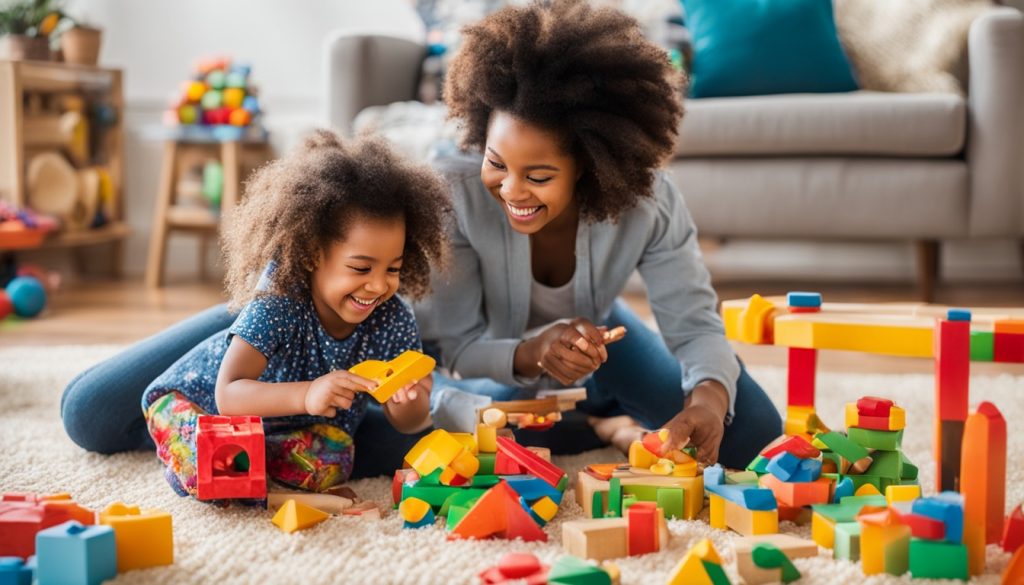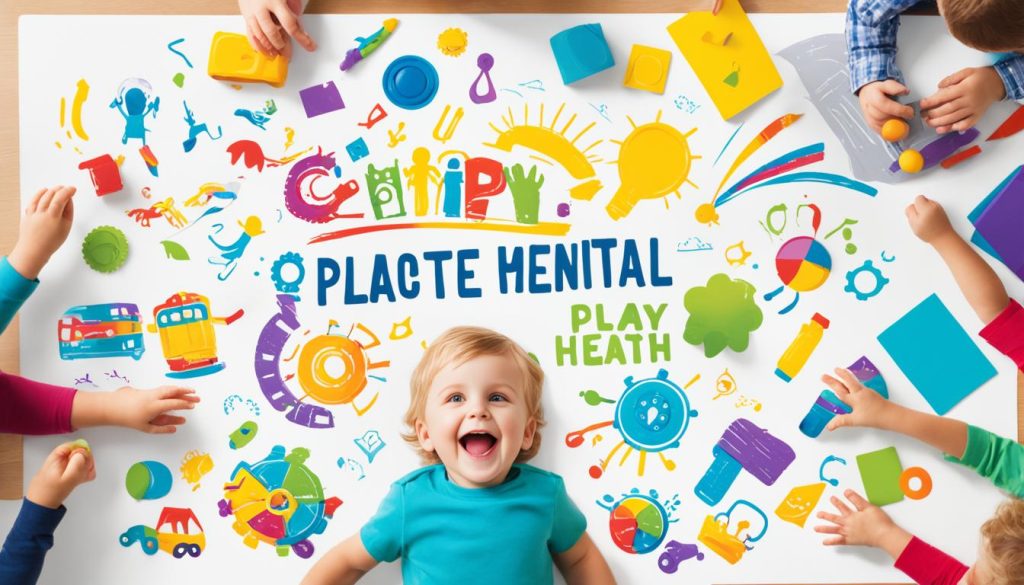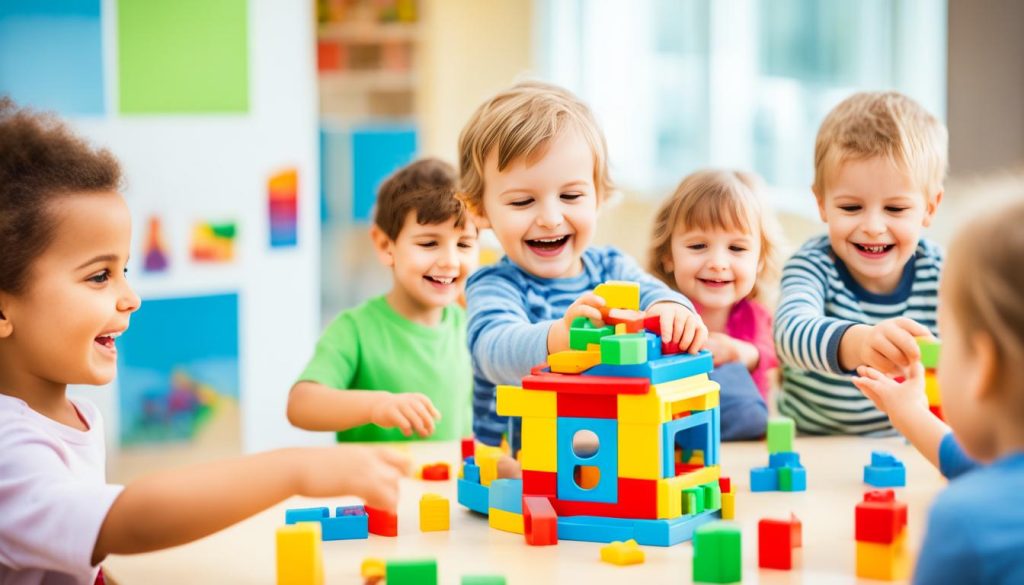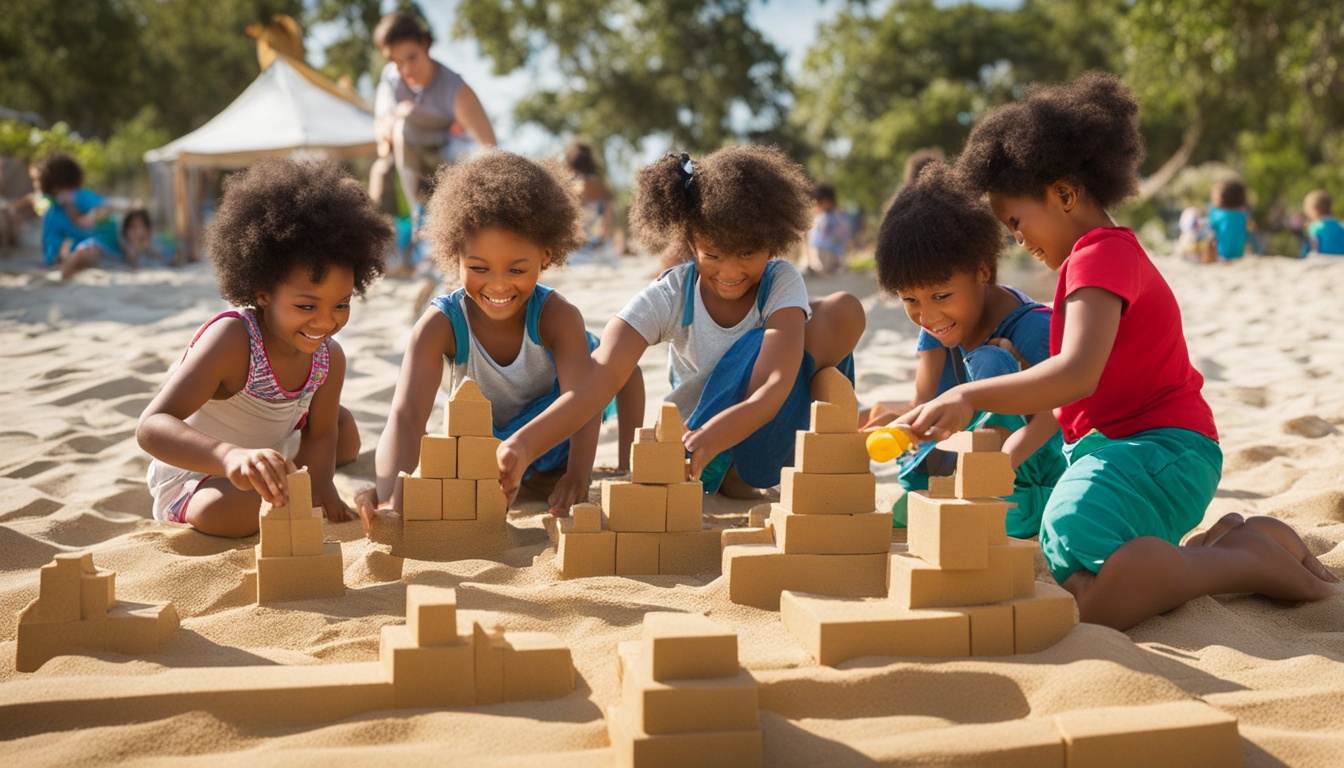Imagine watching your child lost in their own world, playing with a cardboard box or focusing on a puzzle. These simple activities are key to your child’s growth. Play is more than just fun; it’s the base of child development.
Parents often overlook the importance of play in the hustle of daily life. But think about this: the American Academy of Pediatrics says free play helps kids deal with feelings, grow strong, and get ready for tough times. It’s in these moments that kids learn to move, think, and believe in themselves.
We might think play is just a break from our busy lives, but it’s crucial. This time isn’t just extra; it’s vital for your child’s growth. The AAP says play reduces stress and builds strong, caring relationships. These moments of laughter and exploration can shape your child’s future.
Key Takeaways
- Unstructured play is essential for younger children’s imagination and pace.
- Play helps develop children’s fitness, agility, and coordination.
- The American Academy of Pediatrics stresses the need for unstructured playtime to aid emotional and cognitive growth.
- Play encourages resilience, emotional regulation, and stress management.
- Activities such as music and art support cognitive and social-emotional skills, while imaginative play builds friendships and cooperation.
Introduction to the Importance of Play
Play is key to a child’s full growth and development. In Positive Parenting, letting kids choose their play is vital. It helps in Encouraging Child Creativity and strengthens Parent-Child Communication. When kids play freely, they learn a lot about the world, growing in a meaningful way.
Understanding Freely Chosen Play
Freely chosen play means kids decide what to do on their own. This kind of play motivates them to explore and learn about their world. It lets them follow their interests and boosts their emotional and mental health.
They get to try new things in a safe space. This kind of play helps kids grow socially, mentally, and physically. They learn important skills without the pressure of goals.

Play as a Natural and Enjoyable Activity
Play is fun and a natural way for kids to learn and grow. It uses all their senses and helps them develop fully. Whether they’re running or playing make-believe, play makes them happy and ready to learn more.
This kind of play also helps kids talk better with their parents. It makes their bond stronger. Letting kids be creative in their play is key to their happiness and growth.
Physical Benefits of Play
Playing is key for kids’ physical growth. Running, biking, and climbing boost fitness and motor skills. These activities make kids more agile, coordinated, and strong, which is good for their health.
Developing Fitness, Agility, and Coordination
Playing regularly makes kids fitter, more agile, and coordinated. Climbing and playing tag improve their gross motor skills. This is important for their growth.
Studies show that active play boosts fitness and health. It helps with reflexes, movement, balance, muscle strength, bone density, and heart health.
Touching, like hugs and cuddles, is also crucial for kids. It releases oxytocin, helping with emotional and physical growth. For more info, check out this article on hugs and cuddles.

Importance of Outdoor Play
Outdoor play is very important. It lets kids move, explore, and connect with nature, which helps them develop healthy habits. Sadly, kids now play less than before, with many schools cutting recess. This shows we need to make outdoor play a priority.
Outdoor play is good for kids’ minds and helps them manage their feelings. It lowers stress and anxiety and helps them be independent and social. Plus, it makes them more creative, which is linked to success later in life. So, kids should play outside every day for their physical and emotional health.
Emotional and Mental Health Benefits
Play is key to emotional and mental health in kids. It’s a safe space for them to feel and understand their feelings. By letting kids express and explore their emotions, we help them develop positive social and emotional skills. These skills are crucial for their future well-being.

Exploring Emotions Through Play
Kids feel many emotions, and learning to handle them is vital. Play helps them express feelings like joy, anger, and sadness safely. This lets them get to know and understand their emotions better.
Supportive adults play a big role in guiding kids through these feelings. They help create a secure and loving space for kids to grow.
Building Resilience and Coping Skills
Helping kids build resilience and coping skills is key to supporting their mental health. Through play, kids face different challenges that make them think and adapt. This is important for dealing with life’s ups and downs.
A caring environment and setting achievable goals boost kids’ self-esteem. This makes them feel confident and able. Plus, physical activities like outdoor play help their mental health by making them more energetic and less stressed.
Here are some key stats:
- Good Mental Health: Kids with strong mental health feel loved, safe, and secure.
- Mental Health and Wellbeing: Positive social, emotional, and behavioral skills are key for long-term mental health.
- Relationships and Mental Health: A positive relationship with caregivers greatly affects a child’s well-being.
- Behavior and Mental Health: Setting limits and teaching kids to solve problems helps their mental health.
- Physical Health: Being physically healthy is crucial for mental health, helping with stress management.
By focusing on supporting child mental health, building self-esteem, and improving emotional intelligence, we help kids become resilient, confident, and emotionally smart adults.
Social Skills Development
Play is key for kids to learn social skills. It makes them happy and teaches them important social skills. This helps them make good friends later on.

Interaction and Communication
Kids learn how to talk and interact with others through play. Parents help by picking activities that boost their communication skills. This includes making them share feelings, stories, and understand others.
A study by Wong et al. in 2021 found that this helps kids be kind to others. Adding different types of play to daily life helps kids get better at social stuff.
Learning Cooperation and Conflict Resolution
Learning to work together and solve problems is crucial for kids. Play often needs teamwork, teaching kids to share and work together. Studies show that playing together helps kids deal with challenges and solve conflicts.
Through play, kids learn about sharing and social rules. This is key in today’s world where we use technology a lot.
Play and Cognitive Development
Playing is key to helping kids become independent. It helps them think critically and creatively. Through play, kids learn to solve problems in new ways and develop important skills.
Abstract Thinking and Problem Solving
Play, like board games and puzzles, boosts abstract thinking and problem-solving in kids. At 4 years old, kids start to understand size and ask “why.” This shows their curiosity is growing. These activities improve their thinking and keep them focused.
Creativity and Innovation
Play is crucial for kids’ creative growth. Activities like building with blocks or drawing spark their imagination. For kids around 5, a mix of screen time and physical play helps them develop well.
Children this age focus better and can tackle puzzles and games. This strengthens their thinking skills.
- By 16 months, toddlers sort objects by type, laying the groundwork for categorizing things.
- At 4-5, preschoolers become curious about complex topics like sexuality and death.
- Playing with parents builds strong, loving relationships that help kids grow in both mind and heart.
- Preschoolers get better at focusing and solving problems when they do specific tasks like board games and puzzles.
| Age Group | Key Cognitive Development Milestones | Suggested Activities |
|---|---|---|
| Toddlers (16-18 months) | Sorting objects, following simple instructions | Color sorting games, simple puzzles |
| Preschoolers (4 years) | Understanding size, asking “why” questions, short attention spans | Structured Q&A sessions, short interactive play |
| Preschoolers (5 years) | Improved concentration, completing tasks | Advanced puzzles, strategy games |
Combining different play activities helps kids grow in many ways. It lets them meet friends, explore new ideas, and build strong problem-solving and thinking skills.
The Role of Structured vs. Unstructured Play
Understanding the differences between structured and unstructured play helps in creating a balanced approach to child development. Structured play, often led by adults, introduces children to new skills and concepts. It helps with emotional control, sharing, and social skills. This type of play also supports learning new tasks, following instructions, and solving problems step-by-step.
Such play formats improve active listening, talking, and understanding social cues.
On the other hand, unstructured play is key for a child’s independence, confidence, and resilience. It lets children explore their interests at their own pace. This type of play boosts physical activity, motor skills, and coordination. It also helps children handle unexpected situations, which is important in today’s world.
Unstructured play also boosts creativity and lets children try out new ideas and actions.
According to “Becoming Brilliant,” both types of play are crucial for developing important skills. These include communication, teamwork, creativity, critical thinking, and confidence. Michael Patte highlights the benefits of unstructured play on child development. Recent studies say kids need more unstructured time than structured play. But, kids today spend less time in free play.
A mix of both play types is great for kids. Structured play offers a learning framework, while unstructured play encourages creative and spontaneous learning. Talking about Importance of Sleep for Kids and the benefits of play helps with overall well-being. Talking to Kids About Tough Topics can also be done through play, helping children express and process their feelings.
Understanding and meeting different Child Learning Styles in play makes play more inclusive. Structured activities can be tailored for visual, auditory, or kinesthetic learners. Unstructured play suits those who like hands-on or exploratory learning. Switching between structured and unstructured play helps build strong bonds with children, introduces new mentors, and gives a full developmental experience.
| Benefits | Structured Play | Unstructured Play |
|---|---|---|
| Development Focus | Task learning, emotional regulation, social cues | Independence, confidence, resilience |
| Skills Enhanced | Active listening, verbal communication | Creativity, improvisation |
| Physical Impact | Motor skill development (guided) | Motor skill development (self-directed) |
| Support for Child Learning Styles | Visual, auditory, kinesthetic learners | Hands-on, exploratory learners |
| Overall Benefit | Creates structured learning environments | Encourages spontaneous and personal learning |
Combining structured and unstructured play is key for a child’s skill development and a fun childhood. As society changes, it’s important for caregivers to recognize this and make sure kids get both types of play for a well-rounded development.
Parental Involvement in Play
Parents are key in creating a fun play space that helps kids become independent and builds a strong connection with them. By using playful parenting methods and supporting child-led play, you can boost your child’s growth and deepen your bond.
Playful Parenting Techniques
Using playful parenting is a great way to support good behavior and help kids bounce back from tough times. One good method is to play with your child without taking over. This is called Positive Reinforcement Parenting. It means you praise and encourage your child during play. This makes your child feel important and understood.
Studies show that kids who get positive feedback from parents do better with their feelings and thinking skills. Emotional control starts early, and supportive parents help a lot with this. Kids with caring parents also handle social issues better and behave better.
Encouraging Child-Led Play
Supporting child-led play is key for making kids resilient and strengthening your bond. This lets kids make their own play choices, boosting their independence and confidence. By letting them lead, they learn to handle their feelings, solve problems, and be creative.
Kids who play on their own do better in social and thinking skills and feel happier. They also tend to be kinder, work better with others, and share more. Plus, parents who balance guidance with freedom help their kids do well in school and with friends.
| Parenting Style | Characteristics | Child Outcomes |
|---|---|---|
| Authoritative | High responsiveness and high demands | Better emotional regulation, social competence, cognitive skills |
| Authoritarian | High demands and low responsiveness | Higher risk of emotional and behavioral problems |
| Permissive | High responsiveness and low demands | Poor self-discipline and self-control |
| Uninvolved | Low responsiveness and low demands | Poor social and cognitive outcomes |
In conclusion, being involved in your child’s play is crucial for a strong parent-child bond and healthy growth. Through playful parenting and supporting child-led activities, you create a nurturing space. This space helps your kids grow resilient, manage their feelings, and think better.
Play and Digital Technology
Digital technology is becoming a big part of how kids play today. It’s important for parents to manage screen time well. This helps keep a balance between tech and traditional play.
Managing Screen Time
A lot of parents worry about how much time their kids spend on screens. A recent survey found that 71% of parents with kids under 12 are worried about this. Also, 66% of U.S. parents think parenting today is harder than it was 20 years ago, thanks to technology.
It’s key to manage screen time well for kids’ growth. Parents can set rules like no screens during meals or an hour before bed. This encourages kids to do activities that help their minds and feelings grow.
Creating Technology-Free Zones
Setting tech-free areas at home is a good idea. Making places like bedrooms and dining rooms free from tech helps traditional play and family time. This idea matches what 73% of parents believe, that kids shouldn’t have smartphones until they’re 12.
These zones also push kids to play more imaginatively and physically. These kinds of play are important for growing up. Activities like drawing, building with blocks, and outdoor games boost creativity and problem-solving.
*”Two-thirds of parents believe that parenting today is harder compared to 20 years ago due to technology.”*
Dealing with these issues takes effort from both parents and kids. Teaching kids about screen time and offering many play options is key to their growth. By following these steps, families can handle the challenges of parenting in the digital age better.
| Statistic | Percentage | Observation |
|---|---|---|
| Parents concerned about screen time | 71% | Significant concern among parents |
| Parents feeling parenting is harder now | 66% | Technology is a major factor |
| Parents who find technology beneficial | 30% | Enhanced education & entertainment |
| Children allowed a smartphone after 12 | 73% | Majority of parents agree |
| Children using tablets and smartphones | 80% and 63% | High interaction with digital devices |
Encouraging Different Types of Play
It’s important for kids to play in many ways. This helps them grow in all areas. From exploring and using their imagination to playing with others and building things, each type of play is key. It helps them learn, be creative, and understand different cultures.
Exploratory and Imaginative Play
Exploratory play lets kids check out their world and learn new things. They can play alone or with objects, which helps them grow and find what they like. Imaginative play boosts creativity, letting kids make up stories and solve problems in new ways.
For example, building with blocks or pretending to be something else makes kids think differently. It’s a great way to be creative.
Mildred Parten found that kids go through different play stages. At first, they just play alone, then they start to watch and copy others. As they get older, they play together more, learning to work as a team.
Social and Constructive Play
Social play helps kids talk and work with others. They learn about teamwork, sharing, and understanding others. This is key in teaching kids about different cultures.
Competitive play also teaches kids about fair play and bouncing back from setbacks.
Constructive play lets kids make things, which is great for learning and growing. It helps their brains and bodies work better. Activities like dancing or chasing each other improve their coordination and fitness.
By letting kids try different kinds of play, they get ready for life. They learn to handle challenges and make the most of every opportunity.
The Role of Play in Positive Parenting and Raising Kids
Play is key in Positive Parenting. It helps parents bond with their kids and supports growth. Through play, families can grow closer, teach kids to be responsible, and help them understand others. It’s a fun way for parents to support their child’s journey.
Building Bonds through Play
Playtime is vital in Positive Parenting. It strengthens the bond between parents and kids through games and activities. Sarah Moore says play helps kids feel safe and secure, leading to better family relationships.
It’s also a great way to teach kids about responsibility. They learn to share, follow rules, and understand others during play. This helps reduce conflicts and builds cooperation.
Supporting Child Development Milestones
Play is more than fun; it’s crucial for kids’ growth. Dr. Nicole Beurkens notes that today’s kids play less, which might affect their development. Sarah Moore says play helps kids learn and develop important skills.
It boosts cognitive, language, and physical skills. Plus, it lowers stress, which is good for health. Diverse play activities help parents support each child’s unique needs.
The Australian Early Years Learning framework highlights play’s role in early education. By focusing on play, parents can help their kids through important stages of development. This creates a caring and understanding family atmosphere.
| Benefits of Play | Impact |
|---|---|
| Stronger Parent-Child Bonds | Enhanced emotional connection and cooperation |
| Development of Executive Function Skills | Better decision-making and social adaptation |
| Reduced Stress Levels | Lower cortisol levels and improved health |
| Promotes Social Skills | Improved communication and empathy |
Tips for Integrating Play into Daily Routine
Adding play to daily life can be done with creative ideas. These ideas make sure playtime is a priority. They also make activities that get kids moving and interacting.
Making Time for Play
Today, finding time for work and family is tough. But, it’s key to make play a part of your child’s day. This helps your child grow and reduces stress for you and your child. Kids do well with routines, feeling safe and happy, and it helps their mental health and habits.
- Daily Routines and Child Development: Scheduled playtime can enhance child development by providing a sense of stability.
- Encouraging Child Hobbies: Allow your child to pick activities they enjoy, fostering a positive attitude towards play.
- Balancing Work and Family: Carving out at least 15 minutes daily for play can strengthen the parent-child bond and ensure a balanced approach to work and family responsibilities.
Fun Activities to Encourage Movement
Adding playful activities that get kids moving is great for their daily routines. Active play boosts physical health, coordination, and agility.
- Outdoor Play: Activities like hiking, cycling, or playing at the park fit easily into your daily plans. They help with fitness and agility.
- Indoor Games: Simple games like “Simon Says” or dance parties keep kids moving and having fun, even when it’s raining.
- Chores as Play: Make household chores fun. This makes tasks more enjoyable and teaches kids responsibility and about their hobbies.
By adding these playful elements to your daily life, you help your child grow and make family time more fun. Creative strategies help you balance work and your child’s need for play.
Conclusion
Play is key to helping children grow fully. It helps with thinking, moving, and feeling, setting the stage for success. This includes getting ready for kindergarten. By making play a part of daily life, parents help their kids grow and keep family traditions alive.
Parents, especially moms who focus on feelings and creativity, should try different kinds of play. Adding playful ways to discipline helps kids learn to be kind and respectful. Dads bring in traditional values and discipline, balancing out the nurturing.
As kids start school and move through life, the skills they learn from play are crucial. These include solving problems, working together, and bouncing back from setbacks. Play prepares them for school and builds good habits and emotional health. It follows both new parenting ideas and old values. Making play a key part of parenting helps your child grow happily and well-prepared.
FAQ
What is the role of play in child development?
Why is freely chosen play important?
How does play improve physical fitness in children?
How does play foster emotional intelligence in children?
What social skills do children develop through play?
How does play support cognitive development?
What are the benefits of structured versus unstructured play?
How can parents get involved in their child’s play?
How should parents manage screen time for their children?
What types of play should be encouraged for well-rounded development?
How can play strengthen family bonds?
What are some practical tips for integrating play into daily routines?
This post contains affiliate links. If you click on a link and make a purchase, I may earn a small commission — at no extra cost to you. Thank you for supporting this blog and helping me keep the patterns free! Read the full Affiliate Disclosure & Transparency.
